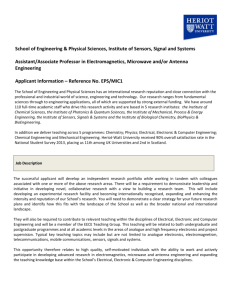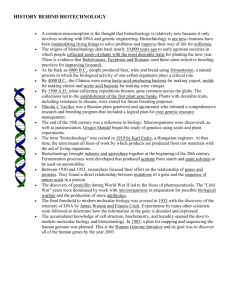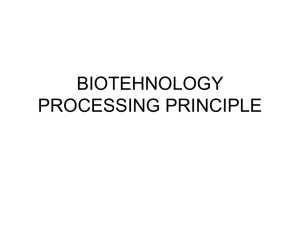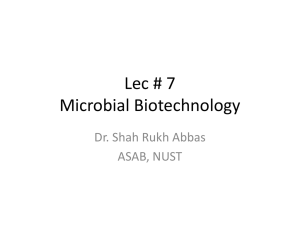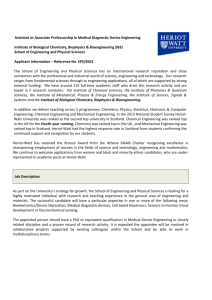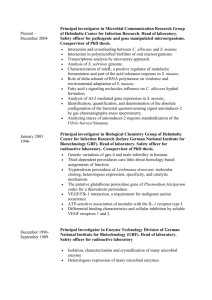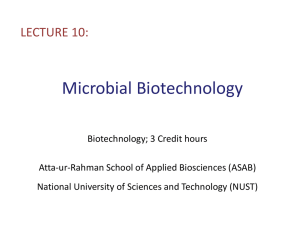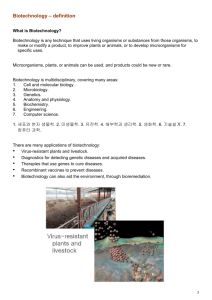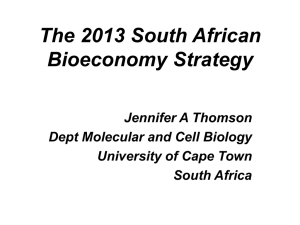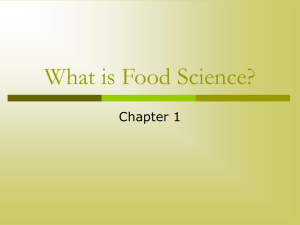Knowledge, skills and experience matrix of Heriot-Watt
advertisement
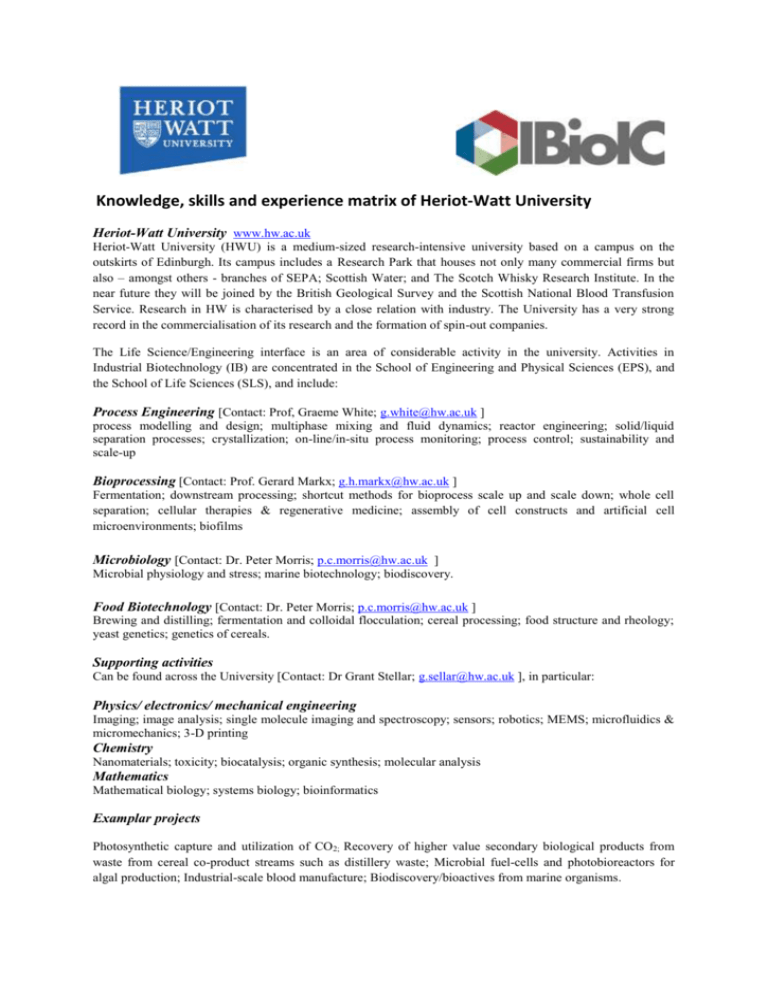
Knowledge, skills and experience matrix of Heriot-Watt University Heriot-Watt University www.hw.ac.uk Heriot-Watt University (HWU) is a medium-sized research-intensive university based on a campus on the outskirts of Edinburgh. Its campus includes a Research Park that houses not only many commercial firms but also – amongst others - branches of SEPA; Scottish Water; and The Scotch Whisky Research Institute. In the near future they will be joined by the British Geological Survey and the Scottish National Blood Transfusion Service. Research in HW is characterised by a close relation with industry. The University has a very strong record in the commercialisation of its research and the formation of spin-out companies. The Life Science/Engineering interface is an area of considerable activity in the university. Activities in Industrial Biotechnology (IB) are concentrated in the School of Engineering and Physical Sciences (EPS), and the School of Life Sciences (SLS), and include: Process Engineering [Contact: Prof, Graeme White; g.white@hw.ac.uk ] process modelling and design; multiphase mixing and fluid dynamics; reactor engineering; solid/liquid separation processes; crystallization; on-line/in-situ process monitoring; process control; sustainability and scale-up Bioprocessing [Contact: Prof. Gerard Markx; g.h.markx@hw.ac.uk ] Fermentation; downstream processing; shortcut methods for bioprocess scale up and scale down; whole cell separation; cellular therapies & regenerative medicine; assembly of cell constructs and artificial cell microenvironments; biofilms Microbiology [Contact: Dr. Peter Morris; p.c.morris@hw.ac.uk ] Microbial physiology and stress; marine biotechnology; biodiscovery. Food Biotechnology [Contact: Dr. Peter Morris; p.c.morris@hw.ac.uk ] Brewing and distilling; fermentation and colloidal flocculation; cereal processing; food structure and rheology; yeast genetics; genetics of cereals. Supporting activities Can be found across the University [Contact: Dr Grant Stellar; g.sellar@hw.ac.uk ], in particular: Physics/ electronics/ mechanical engineering Imaging; image analysis; single molecule imaging and spectroscopy; sensors; robotics; MEMS; microfluidics & micromechanics; 3-D printing Chemistry Nanomaterials; toxicity; biocatalysis; organic synthesis; molecular analysis Mathematics Mathematical biology; systems biology; bioinformatics Examplar projects Photosynthetic capture and utilization of CO2; Recovery of higher value secondary biological products from waste from cereal co-product streams such as distillery waste; Microbial fuel-cells and photobioreactors for algal production; Industrial-scale blood manufacture; Biodiscovery/bioactives from marine organisms. Available Facilities EPS: Level 2 laboratories including culture/fermentation facilities for animal and microbial cells and a variety of on- and off-line analytical techniques including AFM, FACS, RAMAN; facilities for chemical engineering including pilot plant facilities which can accommodate equipment with a height of over 10 m. HWU also hosts the Edinburgh Super Resolution Imaging Consortium (ESRIC), enabling single molecule resolution imaging and advanced microscopic approaches for use in living samples. Other facilities include (laser) microfabrication and photolithography; 3D printing of viable cells. All activities are supported by well-equipped mechanical and electronic workshops and experienced support staff. SLS: Lab and pilot facilities for food research, including pilot-scale brewery, distillery; facilities for aerobic and anaerobic microbiology (up to category 2) and microbial fermentation; facilities for cereal processing; for aquaculture; for microbial and plant genetic engineering; all with associated analytical support (GCMS, HPLC, LC-MS, CHN analysis, MALDI-ToF). Training in IB at Heriot-Watt Heriot-Watt has a long tradition in training students for careers in the bioindustries through established undergraduate and postgraduate courses in Chemical Engineering /Bioprocessing/ Sustainability (EPS: contact pgt.eps@hw.ac.uk ) and Biotechnology (SLS: contact enquiries@sls.hw.ac.uk ). HWU also runs a variety of highly successful and long-running courses in brewing and distilling, and a cluster of courses in marine sciences, including an MSc course in Marine Biodiversity and Biotechnology. The brewing and distilling programmes run an extra-curricular fit-for-work activity throughout the year to enhance student employability.
